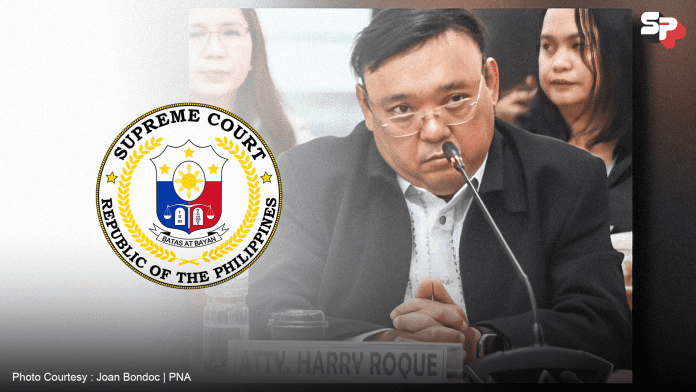MANILA – The Supreme Court (SC) on Tuesday denied the petition for a writ of amparo filed by former presidential spokesperson Herminio “Harry” Roque Jr.
Roque filed the petition following the House of Representatives Quad Committee’s (Quadcom) contempt and detention orders against him in connection with the panel’s inquiry on illegal Philippine Offshore Gaming Operators (POGOs).
He claimed the contempt and detention orders threatened his rights to life, liberty, and security.
“The Court denied Roque’s prayer for the writ of amparo. It held that amparo is not the proper remedy against Congressional contempt and detention orders. The scope of amparo is limited to extralegal killings and enforced disappearances, or threats thereof, which are not present in this case,” SC spokesperson Camille Ting told reporters.
In its order, the SC directed the House Quadcom to comment on Roque’s petition for prohibition.
Roque has also asked the tribunal to prohibit the committee from arresting him, and requiring him to attend future hearings and produce various documents.
SC ruling affirms Congress’ role
Lanao del Sur Rep. Ziaur-Rahman “Zia” Alonto Adiong lauded the SC decision, saying it underscores the role of Congress in exercising its legislative powers, particularly in conducting inquiries in aid of legislation.
“Such inquiries are vital to ensuring transparency, accountability, and the pursuit of truth,” Adiong said in a statement Tuesday night.
He further noted that the high court ruling bolsters Congress’ oversight function, empowering it to monitor and review the actions of other government branches and institutions.
“By upholding our contempt order, the Supreme Court has strengthened our capacity to ensure that public officials and agencies remain accountable to the people, allowing Congress to continue exercising its oversight functions effectively,” he added.
Adiong said the ruling reaffirms the legislative branch’s independence and authority to conduct inquiries without external interference.
“As a co-equal branch of government, Congress holds the exclusive power to investigate matters within its jurisdiction, ensuring that its constitutional mandate is upheld. This strengthens our democracy by safeguarding Congress’ ability to perform its legislative functions with integrity and impartiality,” he said. (PNA)

